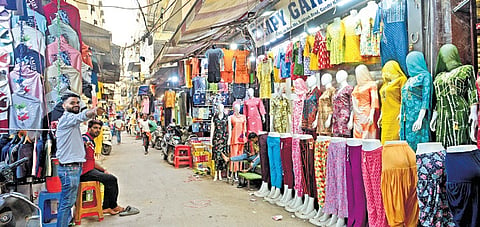

NEW DELHI: Once recognised as Asia’s mega garment hub, Gandhi Nagar in East Delhi now stands as a symbol of civic neglect, economic decline, and repeated political betrayal. Despite ambitious promises under the government’s Rozgar Budget 2022–24, local traders say not a single proposal has materialised — leaving over one lakh workers and traders clinging to hope.
In 2022, the Aam Aadmi Party (AAP) announced Gandhi Nagar’s redevelopment with modern infrastructure: road resurfacing, multi-level car parks at Pushta Road and Shastri Park, improved metro connectivity, and better drainage. However, according to traders, none of these developments ever reached the ground.
“This market is just a name now. There’s no real leadership, and only half the road has even been built,” said Himanshu Jain, a trader with over 40 years in Gandhi Nagar. “Two slum clusters were demolished for highway work, and even the public toilets were removed. People are suffering every day.” “Gandhi Nagar is known across India for garment and textile businesses — Sparky Jeans, started by Gautam Gambhir’s father, is one of many success stories,” said Deshraj Malhotra. “Yet, the market lacks even basic infrastructure to support traders and workers.”
Malhotra, president of the Gandhi Nagar Market Association since 1980, was blunt: “They promised Rs 600 crore for a multiplex. We collected parking fees in good faith, but no parking was ever built. It’s been 15 years of struggle — for proper washrooms, drainage, and multi-storey parking. They said it would be beautified like Chandni Chowk. That was just an election-time story.”
Labour costs have doubled, from Rs 5,000 to Rs 10,000, while GST has crushed small businesses. “The tax regime drives customers to big factories and wholesalers,” said Dharmendra Agarwal. “Kejriwal made promises, but they were just dreams. If Congress or BJP had been here, maybe something would have happened.”
Broken roads, no mobile towers, and network issues add to the chaos. “Online transactions fail constantly,” said Ramesh Jindal. LB Jain added, “Our homes have become factories. Outside every door, vehicles are crammed. Residents have left — it’s no longer liveable.”
Mohit Gupta, who runs a 35-year-old food stall, said customer footfall has dropped. “The market is dead. Businesses suffer.”
Migrant workers from Bihar echo the crisis. “Earlier, I sent Rs 10,000–Rs 12,000 home. Now, I struggle to manage Rs 7,000,” said Ram Yadav. “We share rooms, eat cheaply, and still barely manage,” added Ravindar Pashwan. Security has improved with CCTV cameras, but traders say it came too late. “Pickpockets used to lift shutters. Only after repeated complaints were gangs arrested,” said a group of traders.